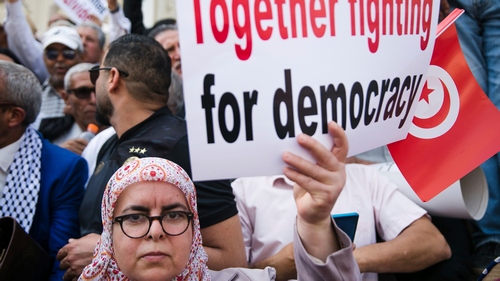The ballot strike in Tunisia
 In 2011, discontent and unrest in Tunisia spread and ignited wider discontent in what became known as the Arab Spring. Now, more than a decade later, protests have returned so that Tunisians may once again put food on their tables.
In 2011, discontent and unrest in Tunisia spread and ignited wider discontent in what became known as the Arab Spring. Now, more than a decade later, protests have returned so that Tunisians may once again put food on their tables.
Tunisia’s president, Kais Saied, assumed almost total power in 2021, having sacked the prime minister, suspended parliament and enacted a constitution that gave him, as the head of state, supreme control and command of the military and granted him the ability to rule by decree.
In December’s election for the new, mostly powerless, legislature most of the opposition political parties announced an election boycott. It resulted in only 8.8 percent of the nine-million-strong electorate voting in the parliamentary elections. A required run-off election was held in January 2023 after only 21 candidates out of 161 Assembly seats were elected in the first round. Just 88,000, or 11 percent of the 7.8 million entitled to vote in the run-offs cast their ballots.
People, rather than feeling cheated of their right to vote, have understood that the election was not a sincere engagement in democracy.
A non-voter explained, ‘He promised serious reforms but we haven’t seen anything. People have had it with these promises and that’s why they boycotted the last two elections. They don’t believe this regime is going to find an answer to their problems, especially their economic problems’ (bit.ly/3ll6WuX).
Another said: ‘We don’t want elections. We want milk and sugar and cooking oil’ (bit.ly/3XipR6Q).
Despite losing legitimacy and credibility, Saied has remained in power, retains the loyalty of the army officers and continues to be recognised as the head of state by foreign governments and international institutions.
For example, he can still negotiate and secure from the International Monetary Fund a $1.9bn loan to finance his 2023 budget and accept the accompanying austerity conditions that will likely lead to ending food and fuel subsidies, cutting public spending on public health, education, social services and the privatisation of state enterprises (bit.ly/3llYbAV).
When in Hong Kong the people were deprived of a say in electing the Legislative Assembly, they saw that the district council elections, previously akin to neighbourhood council elections, offered them an opportunity to express their political preferences. Hong Kong’s pro-democracy candidates won close to 60 percent of the total vote, 347 of the 452 taking control of at least 17 of the city’s 18 district councils.
But once again, as we see with Tunisia, as long as political power is not in the hands of the people of Hong Kong, change will not happen. The election boycott strategy still preserves political power for the government and although its validity is questioned, it remains intact.
There are differences between boycotting elections, abstaining from voting and what is described as the Sinn Fein voting strategy of standing but, if elected, not taking the seat in Parliament.
What is important is capturing political power to exercise the will of the people. Simply abstaining from voting – or not taking the seat – is not sufficient
When there is no genuine socialist candidate, we favour going to the polling station to cast a write-in vote for socialism rather than merely abstaining as this shows that we attach some significance to the existence of the universal suffrage that our antecedents struggled to gain. In this country, where there is a stable political democracy, we favour using it to win political control. In other countries where this is not the case a socialist majority there would be obliged to adopt a different method. There will also be occasions, as in Tunisia, when a parliamentary process will be purposefully gerrymandered to deny the possibility of the people’s will.
We have never held that a merely formal majority at the polls will give the workers the power to achieve socialism. We have always emphasised that our fellow workers must be knowledgeable in the essentials of socialist ideas and be democratically organised.
A socialist party’s role is to strive to be educators, agitators and organisers, to act as catalysts and not to substitute the party for our class. Without an educated and organised working class as the motor for achieving socialism, we cannot have socialism.
William Morris put it well, ’It should be our special aim to make Socialists by putting before people, and especially the working classes, the elementary truths of socialism… efore any definite socialist action can be attempted, it must be backed up by a great body of intelligent opinion — the opinion of a great mass of people who are already socialists…’ (bit.ly/3YDLIqs).
It is not just the quantity of the votes but the quality of the voters behind them that will be decisive.
ALJO
Next article: Communism and socialism: is there a difference? ⮞
